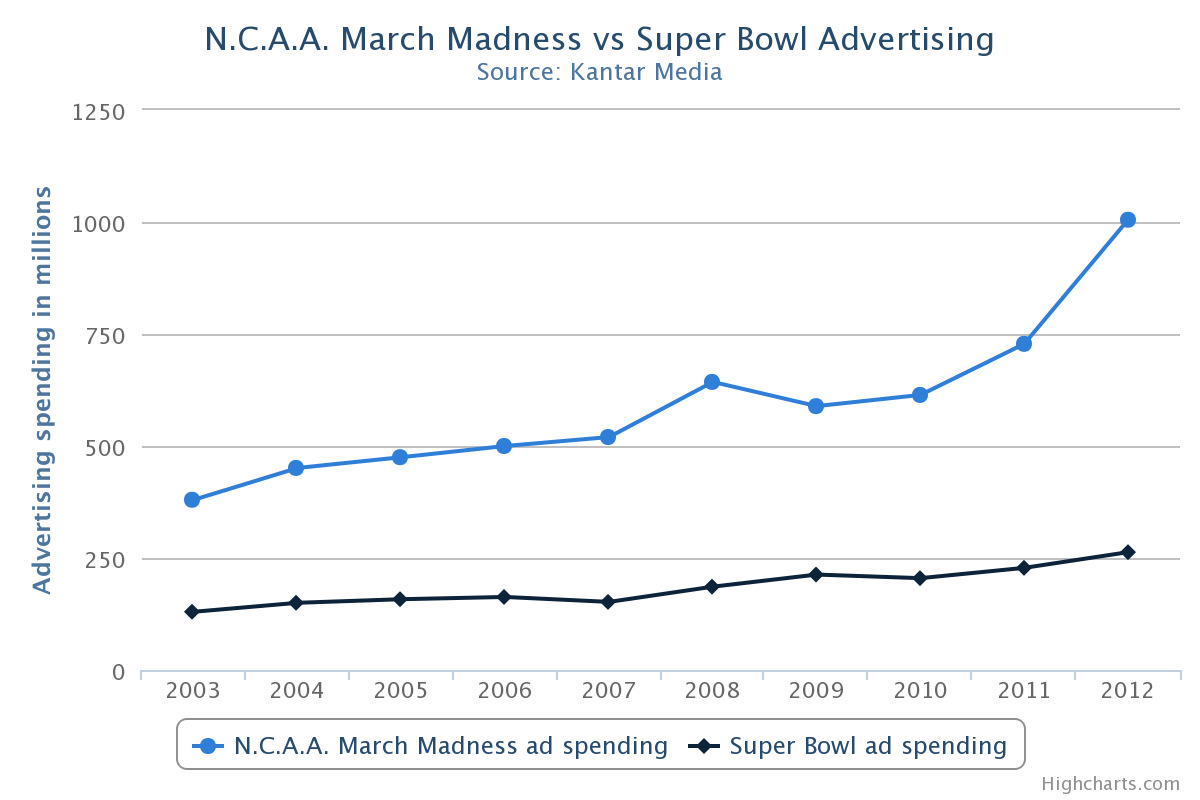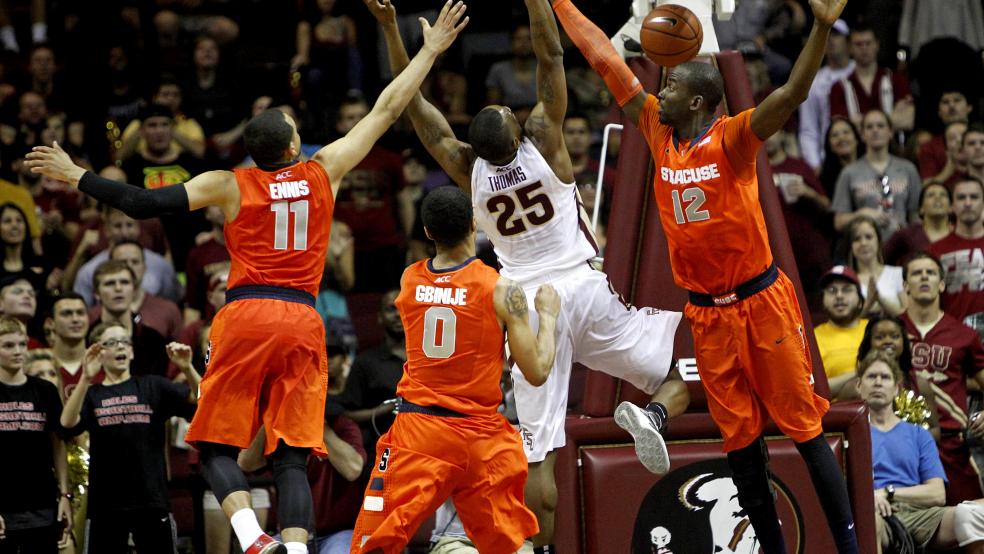It’s a pretty good bet that worker productivity will be down today, as the NCAA basketball tournament, the annual 68-team, multi-billion dollar celebration of hoops Americana kicked off few hours ago.
CBS is broadcasting all of the games online, and it’s a near certainty that someone sitting near you is watching. The consultancy Challenger, Gray & Christmas Inc. estimates that $1.7 billion is lost due to lower productivity during the last two weeks of March.
Related: Rose Bowl Marks a Very Bad Season for the NCAA
Each year the tournament attracts millions of viewers, generating adverting revenue for CBS and its partners. CBS paid a heavy price for the privilege, coughing up $10.8 billion in 2010 to televise the tournament for 14 years.
For CBS, it’s worth every penny. Check out the chart below. It shows that companies spend more on advertising during the tournament then they do during the Super Bowl.

Amid all of this, the tournament is usually a chance for the NCAA to celebrate itself. But this year, it’s different. A new lawsuit, brought by legal powerhouse Jeffrey Kessler, could undermine the way the NCAA has been doing business for decades.
Kessler is challenging the way the NCAA and the big five conferences - the Atlantic Coast Conference, the Big 10, the Southeastern Conference, the Big 12, and the Pac 10 - “compensate” their athletes. Under NCAA bylaws, scholarships for players count as compensation for their services (non-scholarship athletes are unpaid).
Related: How Johnny Football’s Autograph Could Sink the NCAA
In the anti-trust claim brought before a federal court in New Jersey Kessler says that scholarships are not enough. He argues that college football and basketball players make so much money for their universities and the NCAA, they need to be compensated more.
"Instead of permitting individual institutions to compete for the services of players who participate in their major college sports businesses, the NCAA and the power conferences act as a cartel in placing a cap on the athletes' compensation," Kessler said in a statement. "These restrictions are a blatant violation of antitrust laws, have no legitimate pro-competitive justification, and it is finally time to bring them to an end.
Kessler’s argument about the NCAA making money is unassailable. In 2012, the NCAA - technically a non-profit - brought in $841 million. Teams that participated in the tournament received $1.9 million for first round games, with each of the Final Four getting $9.5 million.
Individual schools are also making money off the backs of student athletes. In 2012 the University of Michigan football program brought in $62 million, while the University of Texas Longhorns generated $78 million for the school.
Related: The Big Business of College Football: Who’s Winning?
This money is supposed to go toward scholarships and other university expenses, but large portions of it go to coaches. At Alabama, football coach Nick Saban makes $7 million per year. John Calipari, head coach at Kentucky, makes $4 million per year. Both, by far, are the highest paid employees in their respective states.
The NCAA has yet to respond to the new suit. But in the past, they argued that it provides a forum for athletes to showcase their talents to make money at the professional level. However, only a fraction of NCAA athletes make it to the pros. For instance, only 1.2 percent of college basketball players make it to the pros.
The new lawsuit is part of a broader push to change the way the NCAA deals with student-athletes. A second lawsuit, commonly known as the O’Bannon case, named for former UCLA basketball standout Ed O’Bannon, goes after the NCAA for using likenesses of athletes in promotional materials. O’Bannon, and a host of other former and current college athletes, want to be paid when their pictures are used in advertisements.
This lawsuit has teeth. Electronic Arts, a video game maker who made a game with the likenesses of college football players has already decided to shelve the game and has paid $40 million to athletes featured in the game.
Kessler is no stranger to taking on powerful athletic leagues. He was a lead attorney on the case that established free agency in the NFL in 1992. He has also represented stars like Michael Jordan and Tom Brady in disputes with their respective leagues.
ESPN has called the new suit the “most direct challenge yet to the NCAA's longstanding economic model.” The National College Players Association and its Executive has already endorsed it.
“The bottom line of this collusion by the NCAA and its conferences is that players receive less for their services than they would in a fair and competitive market. This is unfair and hurtful to the athletes,” the group’s director, Ramogi Huma, said.
Top Reads from The Fiscal Times





